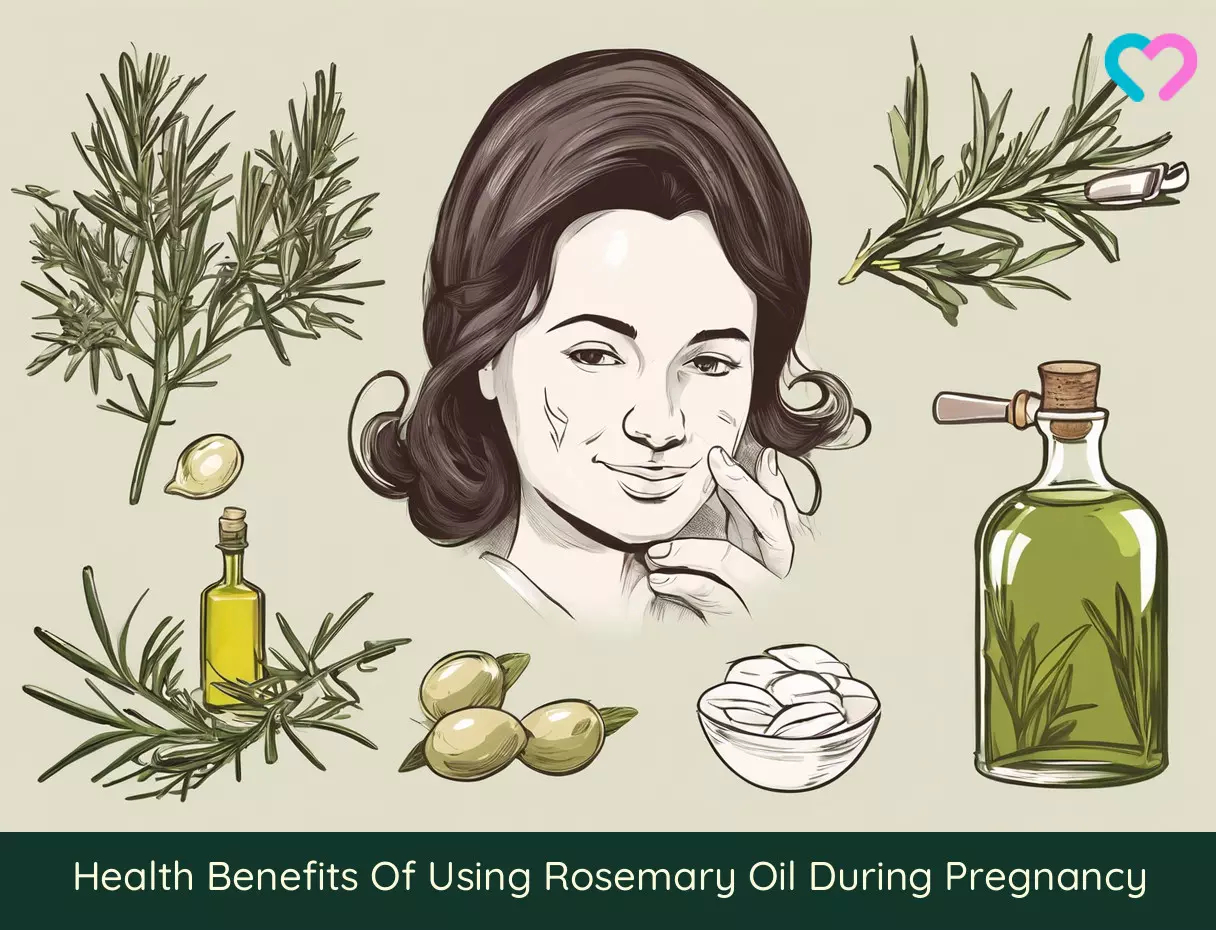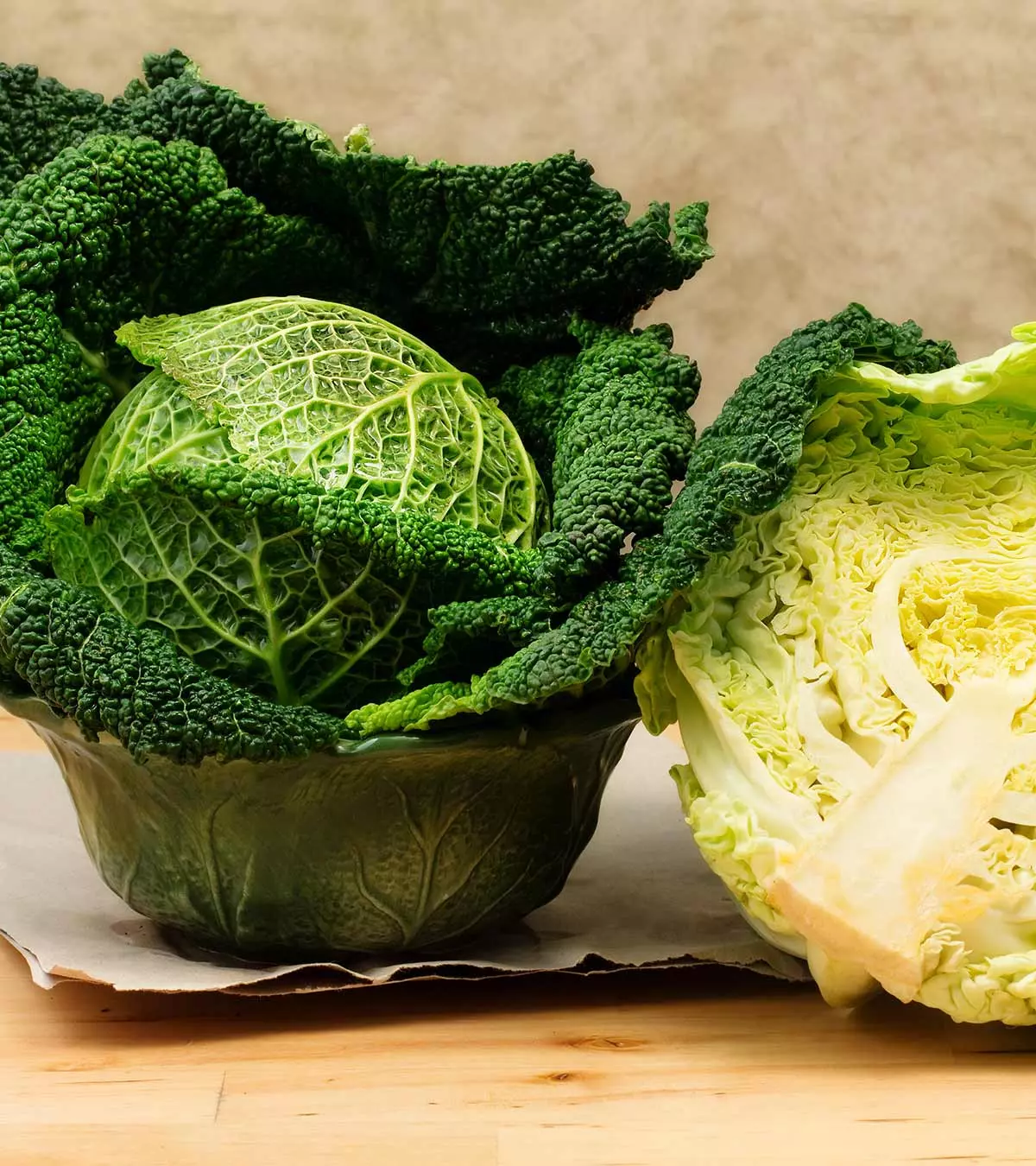
Image: ShutterStock
Essential oils are generally extracted from medicinal plants and used in aromatherapies. But the use of these oils, for example, the use of rosemary oil during pregnancy, may require expert consultation. Rosemary essential oil is derived from the leaves of the rosemary herb, also known as Rosmarinus officinalis. In addition to its aromatic properties, the oil is used for stress relief, muscle relaxation, pain reduction, and alleviation of respiratory issues and skin ailments. It is also a famous culinary herb in Mediterranean regions, where the oil is added to various dishes to add flavor. Romans used the herb in their religious ceremonies as well (11). However, you may need to be extra careful about its use during pregnancy (1). Read on to know more about rosemary oil for pregnant women, including its pros and cons and tips to use it safely.

Key Pointers
- Rosemary essential oil is commonly used for its aromatic properties and medicinal benefits.
- Using diluted and small amounts of rosemary oil during pregnancy is generally safe, but it is best to seek expert opinion before using.
- Rosemary oil has antimicrobial properties and can be used as an effective mouthwash, and to combat colds, allergies, and STDs.
- It also boosts immunity, hair and skin health, reduces pain, and offers stress relief.
- However, rosemary oil contains camphor and is a uterine stimulant, which is why its use during pregnancy is not recommended. It may also induce menstruation and deplete amniotic fluid.
Uses Of Rosemary Oil
Rosemary oil has been around for ages, ancients used it for various purposes, and it can be used to alleviate many ailments. Here are some common benefits below.
1. Serves as an effective mouthwash
Rosemary oil is a brilliant disinfectant and therefore used as mouthwash (2). Dilute the rosemary oil in water and make sure to spit it all out. Also, avoid swallowing the solution.
 Research finds
Research finds2. Alleviates respiratory problems
Rosemary oil, when administered transdermallyiSupplying a medication for absorption through the skin into the bloodstream. , may also help alleviate the symptoms of different respiratory tract diseases (3).
3. Relieves stress

When you are stressed, the glands secrete cortisoliHormone produced by the adrenal glands that regulate stress, blood pressure and sugar, metabolism, and reduces inflammation . If the amount of cortisol in the bloodstream increases, you are likely to feel more anxiety. Moreover, stress causes hormonal imbalance. So, if you are in stress, you can inhale a drop or two of Rosemary oil to reduce stress levels (4).
4. Boosts immunity
If you want a robust immune system, then go for aromatherapy that includes rosemary oil massage (4).
5. May prevent STDs
Some studies reveal that Rosemary oil has antimicrobial and anti-inflammatory properties and helps reduce inflammation caused due to the herpesiAn infection caused by herpes simplex virus (HSV) that spreads through oral or sexual contact and affects the mouth and genital area virus (5).
6. Reduces pain
If you have pain in your muscles, headache, joint pain or sprain, then massage that area with Rosemary oil. It stimulates blood circulation, reduces pain, and helps quicken the healing of wounds (4).

Rosemary oil is also used to prevent indigestion and other digestive problems (12), provide skin nourishment (13), and enhance mood (6). It is also known to boost hair growth and control dandruff. Shilpi Khetarpal, a dermatologist at the Cleveland Clinic, recommends applying no-fragrance, 100% rosemary oil to the scalp. She further suggests using the oil “two or three times a week for six months to see meaningful improvement (14).”
 Did you know?
Did you know?Is Rosemary Oil Safe During Pregnancy?
You tend to be a bit doubtful about using a product if you are pregnant, considering the safety of your growing baby. Consider the health-related issues before using not just Rosemary oil but any other aromatic essential oil as well. Check with your physician before using any such oil during your special months.
Rosemary oil, in particular, is considered unsafe during pregnancy due to the following reasons (7):
- It contains small amounts of camphoriA white crystalline substance used in making plastic, mothballs, and numerous medications which has historically been believed to have contraceptive and abortifacient properties (15). Thus, its consumption may increase the risk of miscarriage.
- It is a uterine stimulant. Thus, expecting moms shouldn’t consume large amounts of it as it can lead to miscarriage (10).
- It is a diureticiA substance that enables the kidneys to produce more urine and get rid of the excess fluid from the body and also emmenagogue in nature i.e. it causes menstruation and depletes amniotic fluid essential for fetal growth (16).
Ensure you use it in diluted form and do not consume or apply the concentrate. Consuming rosemary as a herb in small amounts does not impede or negatively affect fetal growth. But, it is best to avoid using rosemary oil or its other forms in cosmetics because of the lack of safety data for pregnant women.
Frequently Asked Questions
1. Which essential oils should be avoided during pregnancy?
Some essential oils that you should avoid during pregnancy are aniseed, basil, birch, camphor, hyssop, mugwort, pennyroyal, peppermint, rue, sage, tansy, tarragon, thyme, wintergreen, and wormwood (8). Apart from these, there may also be other essential oils to avoid. Therefore, seek your doctor’s advice before using any essential oil.
2. Is rosemary oil in shampoo safe during pregnancy?
Rosemary oil in shampoos is not recommended during pregnancy due to a lack of credible information about the safety of its topical usage during this time (9) (10).
3. How does rosemary oil support a healthy immune system during pregnancy?
Rosemary oil may help maintain a healthy immune system due to its antibacterial and antioxidant qualities, but more research is needed to properly understand its effects in pregnancy (4).
Before using rosemary oil during pregnancy, you must take an expert’s opinion. Though this essential oil is well-known for its wide range of health benefits, such as alleviating stress and pain, it may not be safe in pregnancy. Furthermore, some of the ingredients in this oil could be unsafe for an expectant mother, may pose a risk of adverse pregnancy outcomes, and affect fetal development. Therefore, it is best to consult a herbal medicine expert before using any essential oil, such as rosemary oil, while pregnant.
Infographic: Possible Risks of Using Rosemary Oil During Pregnancy
Rosemary is a popular spice in the kitchen and is also used as a common medicinal herb. However, when it comes to pregnant women, some potential risks are associated with using rosemary oil. So, check out the infographic below to learn about them.
Some thing wrong with infographic shortcode. please verify shortcode syntaxIllustration: Health Benefits Of Using Rosemary Oil During Pregnancy

Image: Stable Diffusion/MomJunction Design Team
Curious about using essential oils during pregnancy? Discover the answers in this enlightening video. Delve into the pros and cons of incorporating essential oils into your pregnancy routine.
References
- Babar Ali et al.; (2015); Essential oils used in aromatherapy: A systematic review.
https://www.sciencedirect.com/science/article/pii/S2221169115001033?via%3Dihub - Marcela A. A. Valones et al.; (2019); Clinical Assessment of Rosemary-based Toothpaste (Rosmarinus officinalis Linn): A Randomized Controlled Double-blind Study.
https://www.scielo.br/j/bdj/a/Bnsc3PnTZB37W8Tn7c7Y6Cg/?lang=en - Györgyi Horváth and Kamilla Ács; (2015); Essential oils in the treatment of respiratory tract diseases highlighting their role in bacterial infections and their anti‐inflammatory action: a review.
https://pmc.ncbi.nlm.nih.gov/articles/PMC7163989/ - Mahboobeh Ghasemzadeh Rahbardar and Hossein Hosseinzadeh; (2025); Therapeutic effects of rosemary (Rosmarinus officinalis L.) and its active constituents on nervous system disorders.
https://pmc.ncbi.nlm.nih.gov/articles/PMC7491497/ - Wafa A AL-Megrin et al.; (2025); Potential antiviral agents of Rosmarinus officinalis extract against herpes viruses 1 and 2.
https://pmc.ncbi.nlm.nih.gov/articles/PMC7286877/ - Rosemary.
https://www.mountsinai.org/health-library/herb/rosemary - Safety Assessment of Rosmarinus Officinalis (Rosemary)-Derived Ingredients used in Cosmetics.
https://www.cir-safety.org/sites/default/files/rosmarinus_1.pdf - Noura S. Dosoky and William N. Setzer; (2025); Maternal Reproductive Toxicity of Some Essential Oils and Their Constituents.
https://www.ncbi.nlm.nih.gov/pmc/articles/PMC7956842/#B11-ijms-22-02380 - B. Sasikumar; (2004); Rosemary.
https://www.sciencedirect.com/topics/agricultural-and-biological-sciences/rosemary - Herbs and Pregnancy.
https://americanpregnancy.org/healthy-pregnancy/is-it-safe/herbs-and-pregnancy/ - Herbs in History: Rosemary.
https://www.ahpa.org/herbs_in_history_rosemary - Joana M Andrade et al.; (2018); Rosmarinus officinalis L.: an update review of its phytochemistry and biological activity.
https://pmc.ncbi.nlm.nih.gov/articles/PMC5905578/ - Federica Li Pomi et al.; (2025); Rosmarinus officinalis and Skin: Antioxidant Activity and Possible Therapeutical Role in Cutaneous Diseases.
https://www.mdpi.com/2076-3921/12/3/680 - Growth Market: How Rosemary Oil May Help Your Hair.
https://health.clevelandclinic.org/rosemary-oil-for-hair - Anthony S. Manoguerra et al.; (2008); Camphor Poisoning: an Evidence-Based Practice Guideline for Out-of-Hospital Management.
https://www.tandfonline.com/doi/full/10.1080/15563650600671696 - I P Lemonica et al.; (1996); Study of the embryotoxic effects of an extract of rosemary (Rosmarinus officinalis L.)
https://pubmed.ncbi.nlm.nih.gov/8731353/
Community Experiences
Join the conversation and become a part of our nurturing community! Share your stories, experiences, and insights to connect with fellow parents.
Read full bio of Michelle Hawksworth
Read full bio of Ria Saha
Read full bio of Swati Patwal
Read full bio of Lorraine Teron


















